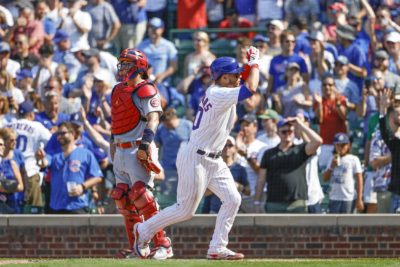Not to be rude or anything, but what happened to the Chicago Cubs dynasty?
After ending the famous 107-year baseball famine by winning the World Series in 2016, I thought the Cubs were supposed to collect a treasure chest of championship rings, take over the NL Central, rule Midwest baseball for a century, flatten Busch Stadium with a wrecking ball, and turn the rival Cardinals into their personal peons.
Or something like that.
The Cubs were outstanding over a time, with franchise renovator Theo Epstein brilliantly preparing his master design for a 2015 rollout.
The Cubs did win two full-season NL Central titles, and got a third in the scrambled, chaotic pandemic-shortened 2020 season.
The Cubs did make the playoffs in four straight years (2015-2018), averaging nearly 97 victories per season.
The Cubs did embarrass the Cardinals, a declining team that lost prestige by missing the playoffs over three consecutive seasons (2016-2018) of sloppy, fundamentally abhorrent baseball.
The Cubs did vanquish the purported curses and ghosts by seizing the World Series trophy in ‘16.
But Wrigley Field never became Camelot.
The Cubs never made it back to the World Series.
After their incredible 2016 season of glory, the Cubs defeated the Nationals in the 2017 NLDS — and didn’t win another postseason round during the Epstein regime.
Epstein’s term in office began in 2012 with a massive tear-down and rebuild. The Cubs had three lost years, averaging only 67 wins from 2012 through 2014.
The Epstein plan to tank and sell off roster parts for prospects and other young talents set up four terrific seasons that included the epic World Series triumph. But in the aftermath the Cubs experienced bitter postseason disappointment and the intensifying fear of lost opportunities.
Is that all there is?
Evidently.
This was no dynasty.
After 59 losing seasons and qualifying for only 13 postseasons from 1909 through 2014, the Cubs became kings in 2016. But their reign didn’t last long, and the bold predictions of multiple World Series titles never materialized. Much of this can be attributed to the Cubs’ surprisingly chronic failure to draft and develop players, especially home-grown pitching.
The Cardinals are a frustrating team with many problems. As the Redbirds go to Wrigley Field for a three-game weekend series, they hold the same record (43-45) as the collapsing Cubs. Tied for third, the rivals teams trail first-place Milwaukee by 9.5 games in the NL Central.

Jun 11, 2021; Chicago, Illinois, USA; Chicago Cubs catcher Willson Contreras (40) crosses home plate after hitting a solo home run against the St. Louis Cardinals during the eight inning at Wrigley Field. Mandatory Credit: Kamil Krzaczynski-USA TODAY Sports
But while the Cardinals lost to the Cubs in the 2015 NLDS and were no real match for the North Siders from 2016 through 2018, the damage sustained by St. Louis was limited and manageable.
The Cardinals have the NL’s fourth-best winning percentage since the start of the 2019 season; the Cubs are sixth. The Cardinals made the playoffs in 2019 and ‘20. The Cubs did not, failing to qualify in ‘19.
There’s a larger point here.
Since the beginning of baseball’s Modern Era (1900), the Cardinals have 11 World Series championships and 19 NL pennants. The Cubs have three World Series championships and 11 NL pennants.
Or if you prefer to stay in more modern times, let’s go with the post-expansion era, which began in 1962 for the NL:
— Cardinals: 21 postseasons, 10 NL pennants, five World Series championships.
— Cubs: 11 postseasons, one NL pennant, one World Series title.
And since Bill DeWitt Jr. took over as Cardinals chairman for the 1996 season:
— Cardinals: 15 postseasons, four NL pennants, two World Series titles, 11 appearances in the NLCS and a .547 regular-season winning percentage that ranks 5th in the majors over the last 26 years. The Cards have had only three losing seasons under DeWitt from 1996 through 2020.
— Cubs: nine postseasons, one NL pennant, one World Series title, four appearances in the NLCS and a .496 regular-season winning percentage that ranks 17th in MLB since ‘96. The Cubs had 13 losing seasons between 1996-2020.
The Cubs delivered a monumental historic achievement in 2016. And though the Cubs’ superiority ticked off the Cardinals and their fans, Chicago’s time as bully was far from enduring. And nothing accomplished by the Cubs transfigured the deep-rooted historical profile of this rivalry.
The Cardinals are still No. 1.
If you want to include the 2015 NLDS, as we should, the Cubs held the boasting rights from 2015 through 2018.
Four seasons.
Four.
The Cardinals took a hit, but it was more of a knockdown than a knockout. More of a glancing blow than a lasting blow. And though the Cubs have won a World Series more recently than St. Louis, both teams won the same number of World Series (one) over the previous 10 seasons.
The Cardinals inexplicably failed to bolster their precariously thin depth last offseason and are sputtering their way into the final series before the All-Star break.
That’s unsatisfactory, yes. But the Cubs are shifting into yet another rebuild.
Epstein resigned last autumn after Cubs ownership muscled into the baseball operation to order a vigorous payroll slashing.
Top starter Yu Darvish was traded to San Diego to save money. Darvish is 7-3 with a 3.09 ERA for the Padres; the Cubs rank 13th in the NL with a 4.74 rotation ERA.
Big’n Kyle Schwarber wasn’t tendered an offer for 2021; the Cubs didn’t want to risk paying him a likely $9 million salary through the arbitration process. Schwarber has 25 homers and is slugging .570 for the Nationals this season, and the Cubs rank 10th in the NL in average runs (4.18) per game.
The Cubs have lost 12 of their last 13 games, and first-year president of baseball operations Jed Hoyer is fielding calls, texts and emails that could lead to the offloading of big-name Cubs before the July 30 trade deadline.
In play for potential trade action are closer Craig Kimbrel, this baseman Kris Bryant, first baseman Anthony Rizzo, shortstop Javier Baez. Other Cubs that could go are starting pitcher Zach Davies, lefty reliever Andrew Chafin, righthanded reliever Ryan Tepera and outfielder Joc Pederson.
“We’ve believed in these guys since 2015,” said Hoyer, the Epstein associate who took over baseball ops last winter. “They’ve had a ton of success, and I would never count these guys out. But 11 days ago, we were certainly fully on the buy side of this transaction and everyone was calling about that. Obviously, people are now calling to see which players are available, so it’s a very different scenario than we expected. Life comes at you fast.”
Hoyer spoke to the media before Thursday’s home game against Philadelphia. The night before, the Cubs had broken their stunning 11-game losing streak. And now, just a few hours after Hoyer conferenced with reporters Thursday, the Cubs fell down again, getting pummeled 8-0 by the Phillies.
At least the Cubs will always have 2016.
“Before we won during the rebuild and up through when we started to become competitive, I would occasionally wake up in the middle of a dream where we had just won the World Series and that moment after you win where you realize that the World Series flag is gonna fly forever, that the curse is over and that we can all rejoice and that so many people’s lives would be forever transformed,” Epstein told NBC Sports Chicago, soon after stepping down. “And in my case, this great relief that I will have accomplished what I set out to do here and then could be free moving forward — only to wake up to the realization that it was just a dream and no, we’re in fifth place and have a lot of work to do.
“And so when we did win and flew back the next morning to Chicago from Cleveland (after winning Game 7), I passed out on my bed and woke up to that same familiar feeling of, ‘Oh, we just won the World Series’ and then had a brief second where I wasn’t sure if it was a dream or not.
“And then realize it was real life and felt this incredible rush of just joy and pride and accomplishment and collective accomplishment and freedom realizing that I had done what I set out to do and could be free from that burden going forward.”
The 2016 World Series may have transformed many lives among the Cubs and their fans.
It did not, however, transform the Cubs-Cardinals rivalry.
The Cardinals could screw up, and fall behind again once Hoyer reloads. It’s become more difficult to have faith in a St. Louis baseball operation that didn’t see the danger of going into the season with a vulnerable rotation and weak bench. It’s nearly impossible to maintain belief in a manager and coaching staff that receives the gift of Nolan Arenado, only to get worse on offense. After all the mistakes — regrettable contract decisions, the trading away of good players, the misplaced loyalties — the confidence in this group is eroding.
The Cardinals took the Cubs’ best shot and recovered in 2019, getting to the NLCS for the fifth time in nine seasons. The Cards survived the Cubs’ big push.
The Cubs aren’t the No. 1 problem for the Cardinals.
The Cardinals are the No. 1 problem for the Cardinals.
After watching the Cardinals win a series in San Francisco, it will be interesting to see how they handle the next test. The Cardinals have been blasted by the Cubs this season, having lost five of the first six games between the teams. But the Cards have an opportunity to charge into Wrigley and take advantage of a down-and-out Cubs team that may be distracted and demoralized by trade talk.
We can talk plenty about the Cubs’ disappearing dynasty. But in St. Louis, we’re more concerned about the Cardinals’ disappearing season. And the Cardinals can’t respond to the challenge of saving the season by stumbling through the weekend at Wrigley.
Thanks for reading …
–Bernie
Check out Bernie’s sports-talk show on 590-AM The Fan, KFNS. It airs Monday through Thursday from 3-6 p.m. and Friday from 4-6 p.m. You can listen live online and download the Bernie Show podcast at 590thefan.com … the 590 app works great and is available in your preferred app store.
The weekly “Seeing Red” podcast with Bernie and Will Leitch is also available at 590thefan.com.
Follow Bernie on Twitter @miklasz
For the last 36 years Bernie Miklasz has entertained, enlightened, and connected with generations of St. Louis sports fans.
While best known for his voice as the lead sports columnist at the Post-Dispatch for 26 years, Bernie has also written for The Athletic, Dallas Morning News and Baltimore News American. A 2023 inductee into the Missouri Sports Hall of Fame, Bernie has hosted radio shows in St. Louis, Dallas, Baltimore and Washington D.C.
Bernie, his wife Kirsten and their cats reside in the Skinker-DeBaliviere neighborhood of St. Louis.



